Buyers Switch to Mental Health Software for Greater Efficiency and Functionality
Mental health management software is not just about booking appointments and patient management for mental health practitioners. The tool helps create treatment plans, offers remote monitoring and teletherapy, and simplifies billing and invoicing for therapy sessions.
However, therapists and psychologists with little to no software knowledge may find it challenging to find a suitable set of features per their requirements or set a budget for investing in mental health software. However, this buyer insights report aims to help you understand such nuances of buying software.
Each year, Software Advice's advisors speak with thousands of software purchase decision-makers evaluating new mental health software for their businesses. We've mined those conversations for insights on budgets, feature needs, and pain points to aid your software search. Our key insights will help you find the right software for your practice.
Key insights
Software buyers from the mental health industry prioritize therapy notes and EHR features during purchase, while actual users consider appointment management the top priority in mental health software.
Most businesses rely on third-party software or manual methods for their day-to-day mental health operations, such as scheduling appointments, billing, and invoicing.
Switching to mental health software is driven by inefficiency and limited functionality in current methods and software and new business opportunities.
The top five specialties investing in mental health software allocate $57-$156 per user per month, with an overall buyer average of $117 per user per month.
Buyers seek therapy notes and EHR functionality, while users rate appointment management as a critical feature
To gain insights into user preferences, we analyzed thousands of mental health software reviews available on Software Advice to identify the features that mental health software users consider the most critical for their daily work. Interestingly, our findings revealed a discrepancy between the priorities of mental health software buyers and users.
Forty percent of actual mental health software users rate appointment management as a critical feature. On the other hand, 93% of mental health software buyers prioritize therapy notes as a feature during software purchase.
These findings indicate that practitioners and businesses already using mental health software find immense value in appointment management as it helps them schedule appointments easily, as per their availability into account, and set up recurring appointments or group sessions with regular patients. Additionally, the software may offer a patient portal where clients can view available time slots, schedule appointments, and receive reminders. It also enables patients to cancel or reschedule appointments through the portal.
On the other hand, buyers seeking mental health software focus more on the therapy notes feature during software selection. An integral part of mental health and EHR software, therapy notes functionality allows practitioners to document the details of each therapy session. This includes information such as the date, time, duration of the session, and any notable events or topics discussed. Practitioners also use therapy notes to track the progress of their clients. They document observations, insights, and changes observed during the session, providing a comprehensive record of the therapeutic process.
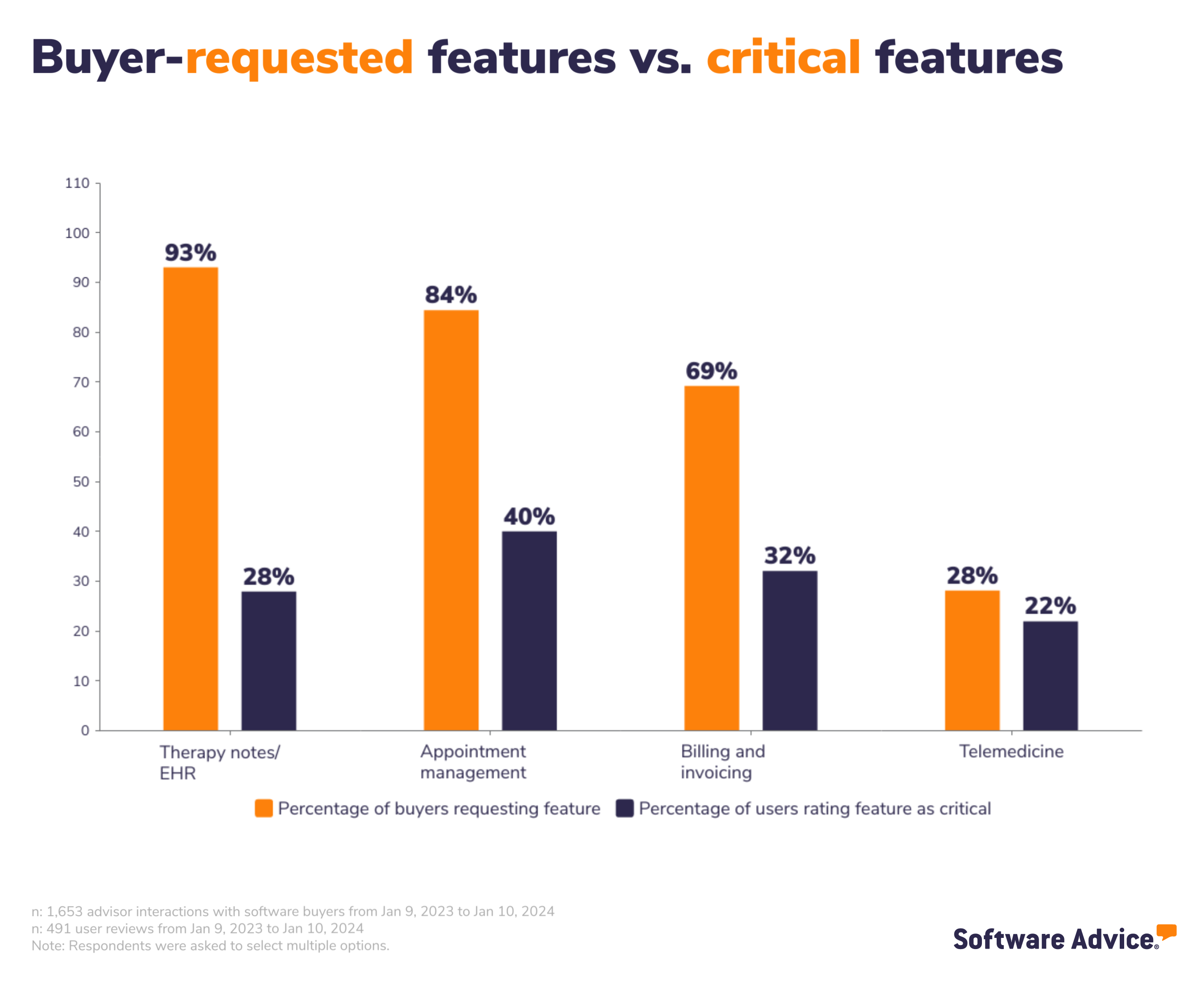
Pro tip
Look for features that support comprehensive documentation, treatment planning, and outcome tracking to assess and measure changes in a client's mental health over time. Moreover, the software should include assessment tools for conducting standardized assessments, such as Beck Depression Inventory (BDI) or the Patient Health Questionnaire (PHQ-9), and gathering relevant client information.
Most businesses rely on third-party software or manual methods for their day-to-day mental health operations
When our advisors asked buyers what methods they were currently using to handle their day-to-day mental health operations, here's what they found:
Thirty-two percent of buyers use third-party software, such as EHR software, practice management software, and video conferencing solutions to schedule patient sessions, manage billing and invoicing, and keep track of patient data.
Thirty-one percent of buyers use manual methods to manage billing, keep track of patient appointments, take notes during sessions, and track patient data.
While such methods can help manage day-to-day operations, having a dedicated mental health platform can help increase the accuracy and efficiency of various administrative tasks, such as appointment scheduling, billing, and documentation. This reduces the time, resources, and effort spent on manual paperwork, allowing practitioners to focus more on patient care. Mental health software also provides secure communication channels for practitioners to communicate with clients, reducing the reliance on phone calls.
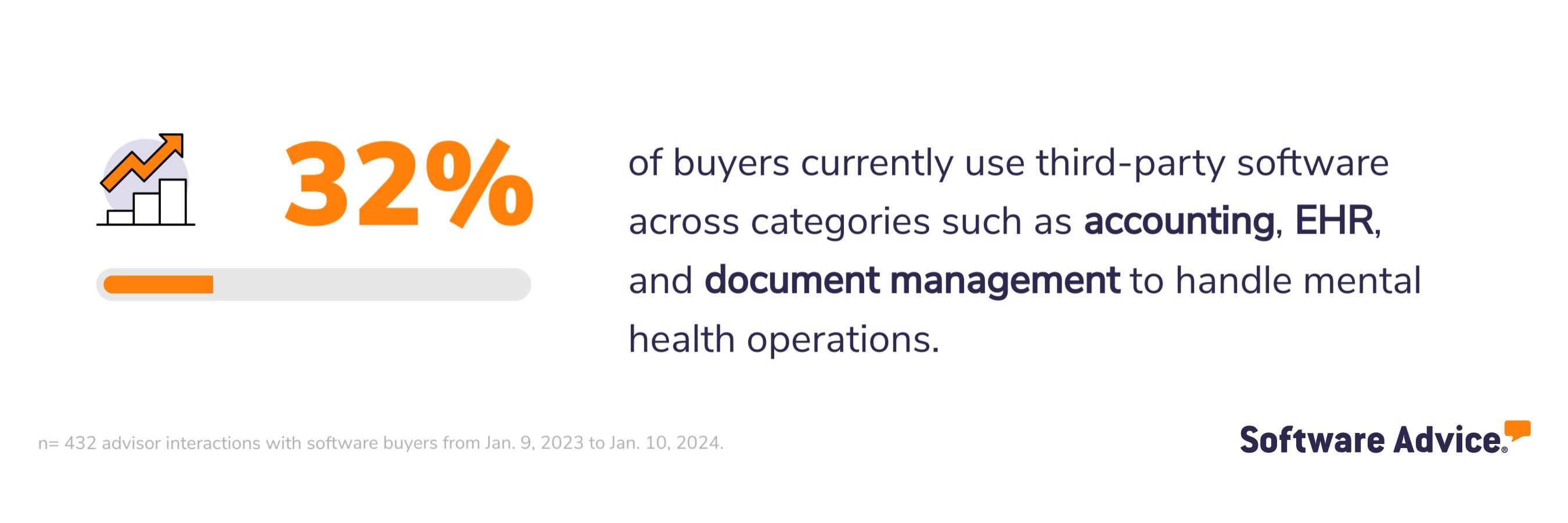
Clubbing all required functionality within a single mental health system eliminates the need to invest in multiple third-party software and manage their licenses, subscriptions, and integrations.
Pro tip
If you specialize in a particular area (e.g., trauma, addiction, or specific therapeutic modalities), seek software that allows customization to align with the unique needs of your specialty. For example, a child psychologist may need assessments tailored for pediatric mental health, while a substance abuse counselor may require tools specific to drug rehabilitation.
Inefficiency, limited functionality, and new business opportunities are key drivers of mental health software switch
Our advisors conversed with buyers currently using either manual methods or third-party software and seeking a switch to mental health software. These discussions shed light on businesses' real-life challenges with their existing tools. These included inefficiency (32%), limited functionality (26%), and new business opportunities (22%).
Inefficiency: Third-party tools often don't help automate routine tasks such as appointment scheduling, billing, or invoicing, ultimately making practitioners handle these processes manually.
Limited functionality: If the current software lacks essential features such as appointment management, digital note-taking, and treatment planning, practitioners may be constrained in patient care. Third-party software often fails to centralize patient data, ultimately leading to manual inputs, which can cause delays.
New business opportunities: As practitioners' client pool grows, they may need dedicated mental health software to manage patients, their data, and treatment plans. Such demands for scalability are a primary reason for switching to mental health software.
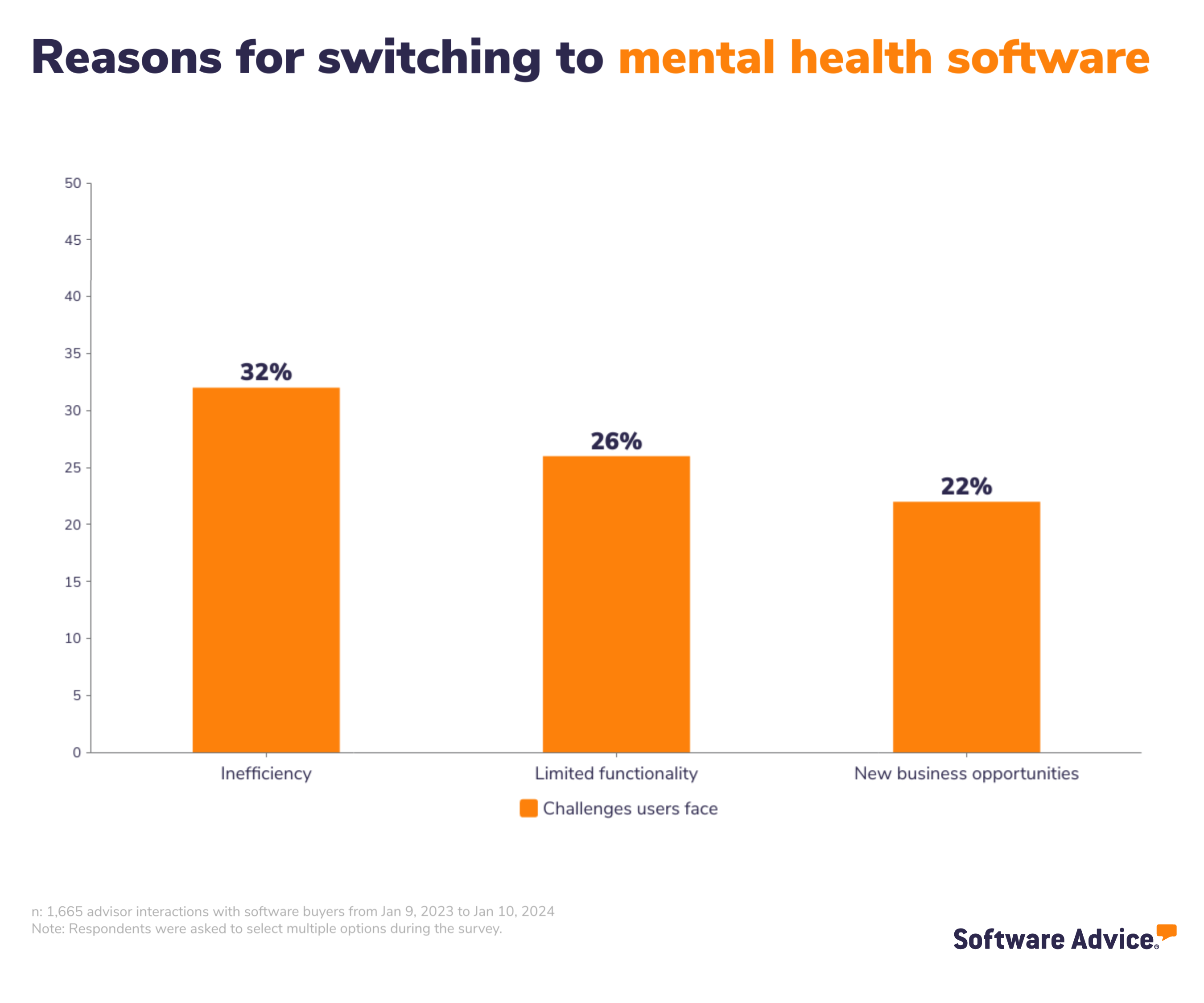
Pro tip
If you work in a multi-disciplinary setting, prioritize software that facilitates secure communication and collaboration with other healthcare professionals involved in a client's care. This would help you get a holistic understanding of your patients’ physical ailments, if any, which may be affecting their mental wellness as well.
Use cases for mental health software
Therapists and mental health specialists use mental health software mainly to schedule appointments and send automated reminders to clients about upcoming sessions. Some practitioners integrate their calendars with the software to manage their appointments more efficiently.
Applied behavior specialists utilize mental health software to maintain comprehensive electronic records of their clients. This includes storing assessment results, treatment plans, progress notes, and other relevant information in a secure and organized manner.
Many mental health software solutions include assessment tools that therapists use to conduct standardized assessments and gather information about a client's mental health status. These tools may help in diagnosing conditions and tailoring treatment plans. Therapists utilize teletherapy features within the software to conduct remote therapy sessions with clients. This is especially valuable for reaching clients who may have geographical constraints or difficulties attending in-person sessions.
Therapists leverage features for outcome tracking to assess the effectiveness of interventions and measure the progress of their clients. This helps in making data-driven decisions about the course of treatment. To simplify financial processes, multi-specialty hospitals use the software for billing and invoicing. This includes generating invoices, tracking payments, and managing insurance claims.
The average buyer’s budget ranges from $57-$156 per user per month
The budget for purchasing mental health software varies from specialty to specialty based on factors such as practice size, the number of users, and the required features and functionalities.
However, the average budget across specialties for purchasing mental health software was approximately $117 per user per month.
Pro tip
Understand the total cost of ownership, including subscription fees, implementation costs, and any additional charges. Some software would charge you based on the number of clients you handle while others would charge you based on the number of software users.
More resources for your software search
Whether you’re looking to buy new mental health software or replace your existing tool, here are some additional resources to aid your software search:
Start with our interactive mental health software directory to compare hundreds of products, filter your search by specific features, and read comprehensive reviews from SMB leaders.
Check out top-rated mental health software based on user ratings and popularity in the Mental Health Software Frontrunners Report.
Go through the mental health software buyers guide to better understand the market.
Buyer demographics
The buyers we interacted with are largely small businesses. You’ll find the demographics of the buyers below, so you can see the sizes and types of businesses.
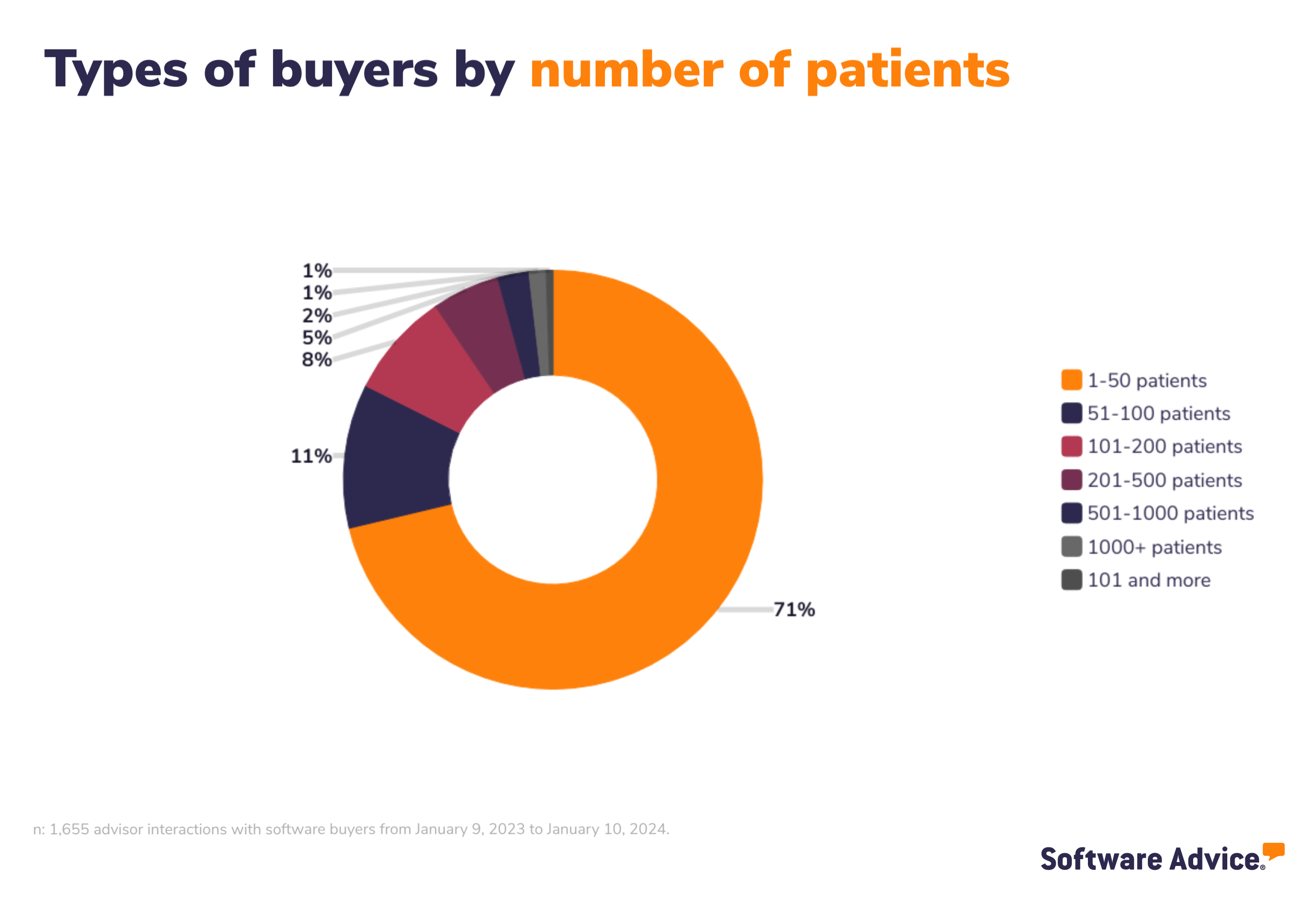
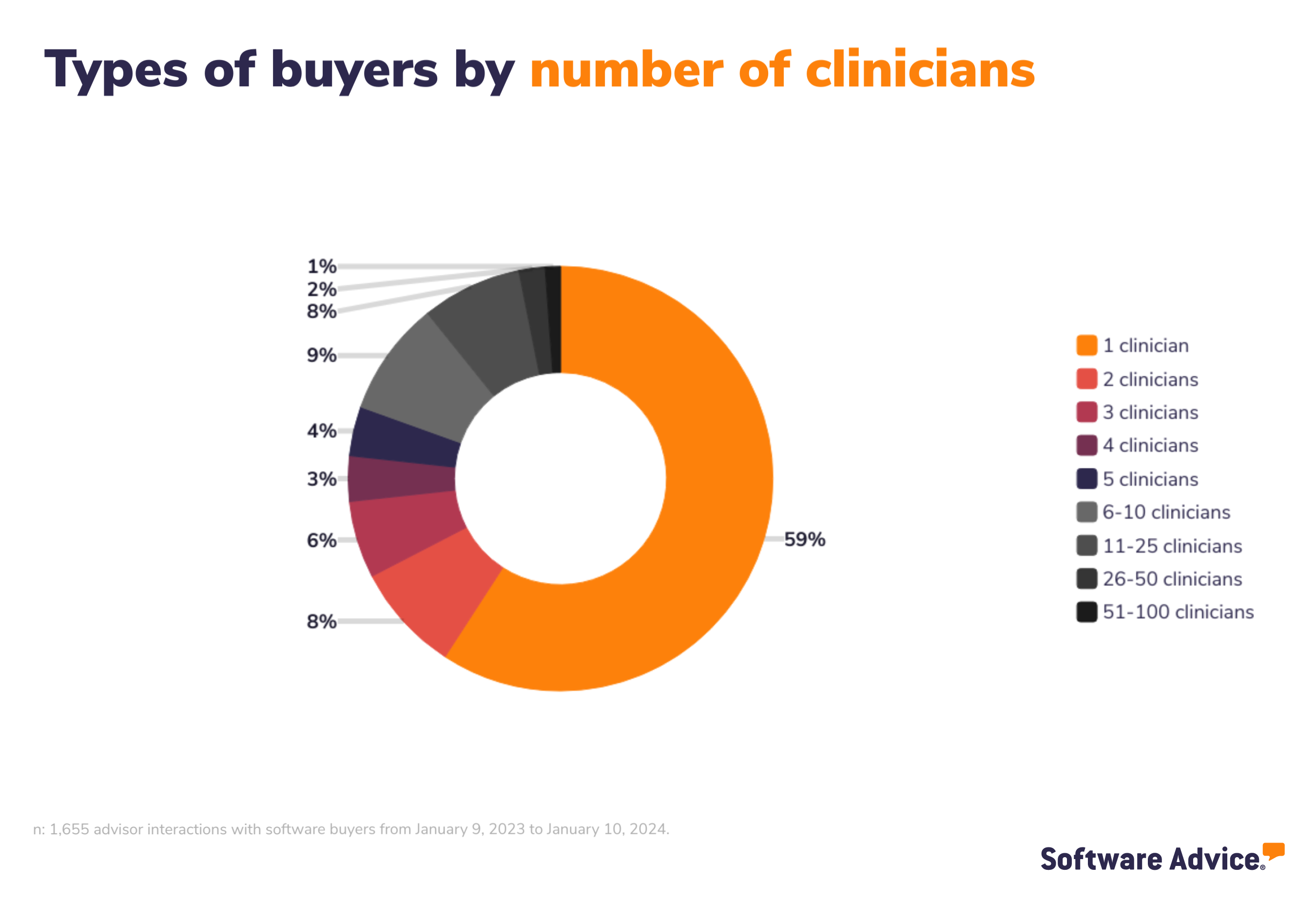
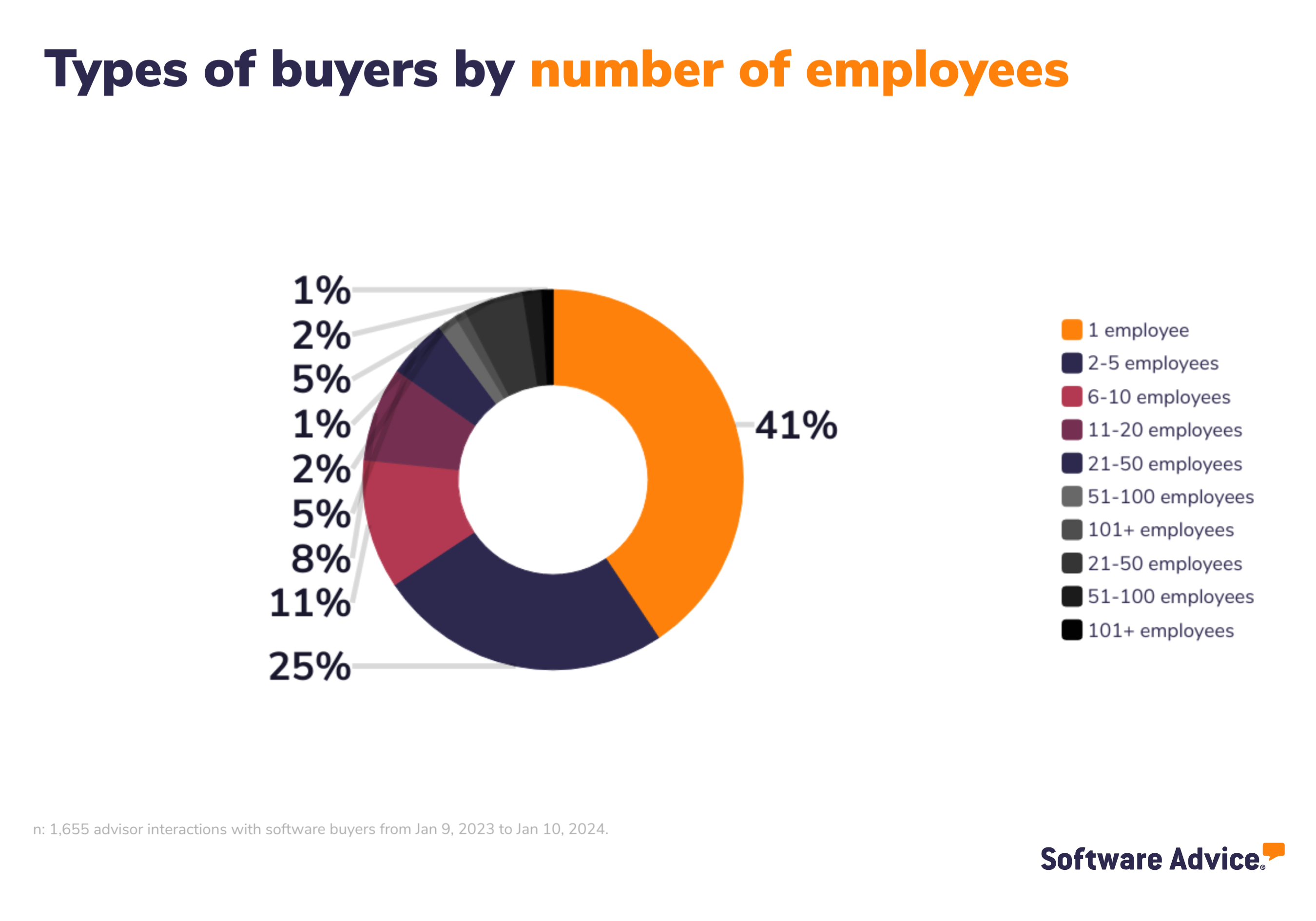
Methodology
Software buyers analysis methodology
Findings are based on data from conversations that Software Advice’s advisor team has daily with software buyers seeking guidance on purchase decisions. The data used to create this report is based on interactions with small-to-midsize businesses seeking mental health management tools. For this report, we analyzed approximately 1,655 phone interactions from Jan 9, 2023, to Jan 10, 2024.
The findings of this report represent buyers who contacted Software Advice and may not be indicative of the market as a whole. Data points are rounded to the nearest whole number.